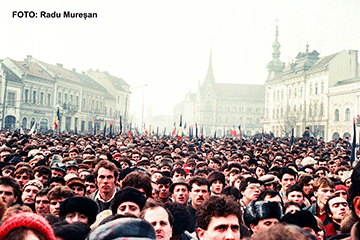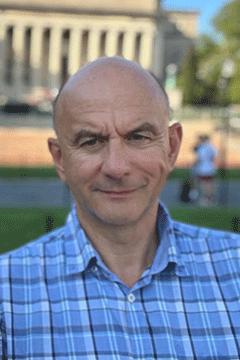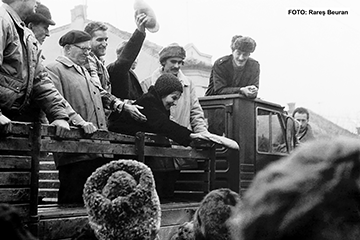
08/29/2023
A series of riveting historical images from a documentary that captures the final, violent end of totalitarian communism in Eastern Europe, went on display in SUNY Cortland’s Old Main Colloquium starting Monday, Aug. 28.
Presented by the university’s Clark Center for Global Engagement in collaboration with the Dowd Gallery, the exhibition titled “1989. Struggle for Democracy” documents the bloody, nine-day revolution that marked the end of communist control in Eastern Europe.
1989 was a landmark year for the former communist states of Central and Eastern Europe, as the collapsing Soviet Union loosened its control. Most of them made a peaceful transition from totalitarianism to democracy, with one exception — Romania, which was the only country where the transition to a democratic regime was carried out violently and where the leaders of the old regime were executed. The Romanian Revolution, the first revolution broadcast live on TV, took place between Dec. 16 and Dec. 25, and involved demonstrations and street fighting leading to the fall of former dictator Nicolae Ceausescu and the former communist regime.
The exhibition presents a selection of photos taken in Cluj-Napoca, the historic capital of the Transylvania region of Romania, by professional and amateur photographers during the Romanian Revolution from 1989. This was during a time when black and white photos were still extremely rare due to both technological and political reasons.
“In the 1980s Romania was a time of penury when many products were very hard to find, if not impossible,” said Clark Center Director Alexandru Balas. “It was very expensive and not usually available in stores; and you would have to develop the photos in your self-made dark room, usually in the bathroom.”
An opening reception for “1989. Struggle for Democracy” and a screening of the documentary from which the images were pulled, will be held in the Old Main Colloquium on Wednesday, Sept. 30. The event begins at 4:30 p.m. with the documentary starting at 5 p.m.
Professor Rareș Beuran, the project’s coordinator and a lecturer in the Journalism and Digital Media Department, Faculty of Political, Administrative and Communication Sciences at Babeș-Bolyai University, Cluj-Napoca, Romania, will attend the opening reception and give a brief introduction.

Afterward, Beuran will offer short remarks about the 50-minute documentary itself, which is titled “Photographic Testimonies from the Revolution. Cluj-Napoca, December 1989.”
The exhibition, opening reception and film screening are all free and open to the public.
They are part of a larger research initiative of visually reconstructing local history through images immortalized by photographers, according to Beuran. Some of these photos were never published.
“The aim of this initiative is to increase the level of information of the young generation to stimulate intergenerational dialogue about the 1989 Revolution and the values of democracy,” Balas said. “This is necessary given the attacks on democracy in many countries around the world.”
Beuran also will engage in campus activities for several days. He is a visiting scholar with the Clark Center as part of the European Commission’s Erasmus+ KeyAction1 mobility project.
Erasmus stands for EuRopean Community Action Scheme for the Mobility of University Students and is a European Union (EU) student exchange program established in 1987. The newer Erasmus+, or Erasmus Plus, program was started in 2014 and combines education, training, youth and sport aspects.
As of 2014, 27 years after its creation, the program has promoted these scholarly exchanges, termed “mobilities,” of more than 3.3 million students within the European community. More than 5,000 higher education institutions from 38 countries are participating in the project.
The EU pays the cost for these academic exchanges.
Beuran joins a larger group of Babes-Bolyai University scholars visiting the SUNY Cortland campus during the fall semester, Balas said. That includes professors Cristina Nistor and Constantin Trofin from the Journalism and Digital Media Department, Professor Adina-Letitia Negrusa from the Business Department, and Carmen Tagsorean, head of office to Babes-Bolyai University’s Center for International Cooperation.
“As part of the same Erasmus+ KeyAction1 project, seven professors and staff members from SUNY Cortland visited Babes-Bolyai University for one week earlier in 2023 to enhance our institutional partnership,” Balas said.

They were Distinguished Professor John Foley, Physical Education Department; Associate Librarian Daniel Harms, Memorial Library; Assistant Professor Odalis Hildago, Modern Languages Department; Assistant Director of Systems and Information Security Eli Simon, Information Systems and Security; Senior Academic Counselor Judy Stoddard, Educational Opportunity Program; and Associate Professor Maria Timberlake, Foundations and Social Advocacy Department.
“Our institution has signed more Erasmus+ KeyAction1 institutional agreements and we hope to offer an increased number of such mobility opportunities to our Cortland students, professors and staff in the near future,” Balas said.
The exhibition and related events are co-sponsored by SUNY Cortland’s International Studies Program, the Project on Eastern and Central Europe and the President’s Office. For more information about this and other programs organized by the Clark Center, contact Alexandru Balas at 607-753-4823.
IN THE TOP IMAGE, amateur Romanian photographer Radu Mureșan’s untitled 1989 filmography still image shows the first democratic gathering in Cluj-Napoca after the former dictator Nicolae Ceausescu fled the capital city. Citizens are shown listening to dissident Doina Cornea’s first speech on Dec. 22, 1989.